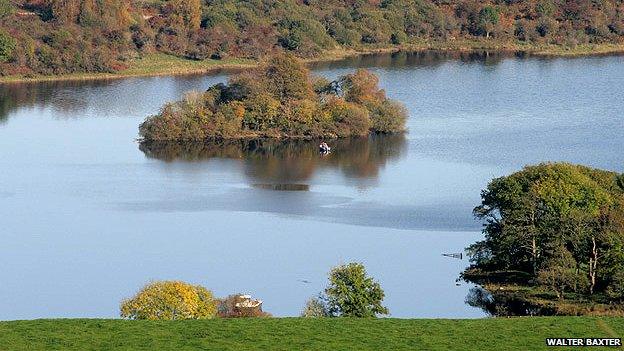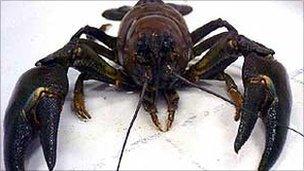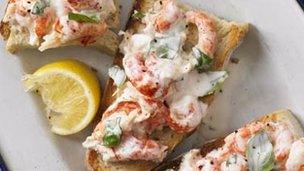Loch Ken crayfish business plan hatched
- Published

The waters of Loch Ken are believed to contain millions of non-native North American signal crayfish
"If you can't beat them, eat them."
As mottos go, it might sound a bit gruesome, but it sums up a business enterprise being contemplated in south-west Scotland.
An economic opportunity has been spotted in an "invasion" of non-native North American signal crayfish in the region's waters.
It could end up with them being served on dining tables up and down the country.
The crayfish have been the source of environmental and economic heartache for some time.
They were imported to the UK in the 1970s with escapes from fish farms or illegal releases thought to be the reason for their spread to other waterways.
First found in Scotland in 1995, they have been blamed for eating young fish and destroying habitats and now affect a large number of rivers and lochs across the country.

The North American signal crayfish has been blamed for destroying habitats in the loch
Last year a barrier was erected to try to stop their spread from the River Clyde to the River Annan.
But one of the worst-hit places is Loch Ken in Dumfries and Galloway where a five-month trapping programme three years ago killed more than 700,000 of them but failed to eradicate the problem.
The population is now estimated to run into millions and has been blamed for devastating a once-thriving angling economy.
Environmental experts believe eradication is almost impossible and have adopted a containment strategy.
John Thom, a community councillor in New Galloway, where local hotels and tourist businesses have suffered a downturn in trade, believes there is a way to turn the situation to the area's advantage.
He said it was now time to accept that the crayfish were there to stay and establish a commercial crayfish fishery.
"It is actually just a total economic and ecological disaster that is unfolding in front of us, so something has to be done about it," he said.
"Unless we actually sort this problem there are going to be a lot more people made redundant in the area."
Mr Thom said the "big attraction" of the project was that it could help recover some of the jobs being lost to the "infestation".
The idea would be to trap crayfish and land them by boat at a disused fish farm next to the loch.
Former owner Graeme Gordon said it would have the facilities needed to get the fish ready for sale.
"I think there is very considerable potential because they are quite a high price food," he said.
"At the moment they are imported from Holland or Thailand and various other places."

The crayfish could end up on tables around the country if the plans can proceed
He said it would be a "bit ridiculous" if they were not able to use the commercial opportunity to "employ local people and make use of a local asset".
It is a product that Caroline Lawrie, who owns a restaurant a few miles from Loch Ken, would be only too happy to use.
She currently imports crayfish from Denmark or Thailand and said that something produced on their doorstep and providing local jobs would be "wonderful".
However, there are a few obstacles to be cleared before the plan could progress.
Trapping is illegal without a licence and they are not easily obtained because of the danger of spreading the crayfish to other waters.
However, there is hope in the area that the Scottish government and advisory bodies like Scottish Natural Heritage will accept that a more pragmatic approach is required.
That belief could be tested if a licence application is submitted in the coming months.
Mr Thom said he did not think the difficulties facing the project were insurmountable.
"It can be done if people use common sense and put their minds to it. It can all be sorted out," he said.
- Published30 June 2011
- Published18 May 2011
- Published8 October 2010